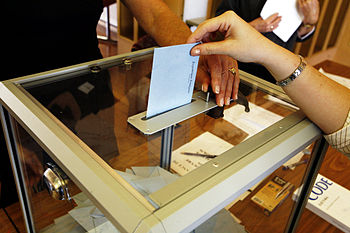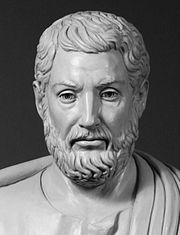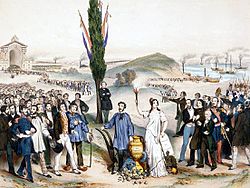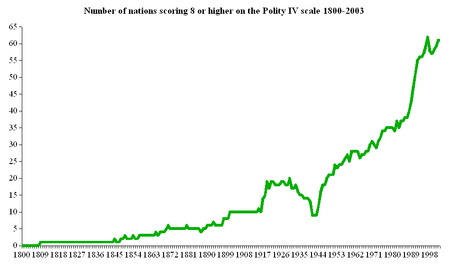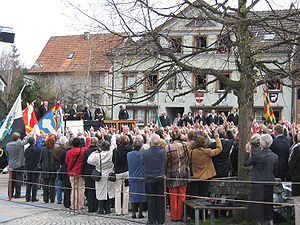
Democracy
About this schools Wikipedia selection
This Schools selection was originally chosen by SOS Children for schools in the developing world without internet access. It is available as a intranet download. With SOS Children you can choose to sponsor children in over a hundred countries
Democracy is a form of government in which all eligible citizens have an equal say in the decisions that affect their lives. Democracy allows eligible citizens to participate equally—either directly or through elected representatives—in the proposal, development, and creation of laws. It encompasses social, economic and cultural conditions that enable the free and equal practice of political self-determination.
The term originates from the Greek δημοκρατία (dēmokratía) "rule of the people", which was coined from δῆμος (dêmos) "people" and κράτος (kratos) "power" in the 5th century BCE to denote the political systems then existing in Greek city-states, notably Athens; the term is an antonym to ἀριστοκρατία(aristocratie) "rule of an elite." While theoretically these definitions are in opposition, in practice the distinction has been blurred historically. The political system of Classical Athens, for example, granted democratic citizenship to an elite class of free men and excluded slaves and women from political participation. In virtually all democratic governments throughout ancient and modern history, democratic citizenship consisted of an elite class until full enfranchisement was won for all adult citizens in most modern democracies through the suffrage movements of the 19th and 20th centuries. The English word dates to the 16th century, from the older Middle French and Middle Latin equivalents.
A democratic government contrasts to forms of government where power is either held by one, as in a monarchy, or where power is held by a small number of individuals, as in an oligarchy. Nevertheless, these oppositions, inherited from Greek philosophy, are now ambiguous because contemporary governments have mixed democratic, oligarchic, and monarchic elements. Karl Popper defined democracy in contrast to dictatorship or tyranny, thus focusing on opportunities for the people to control their leaders and to oust them without the need for a revolution.
Several variants of democracy exist, but there are two basic forms, both of which concern how the whole body of all eligible citizens executes its will. One form of democracy is direct democracy, in which all eligible citizens have direct and active participation in the decision making of the government. In most modern democracies, the whole body of all eligible citizens remain the sovereign power but political power is exercised indirectly through elected representatives; this is called representative democracy. The concept of representative democracy arose largely from ideas and institutions that developed during the European Middle Ages, the Age of Enlightenment, and the American and French Revolutions.
Characteristics
While no consensus exists on how to define democracy, equality and freedom have both been identified as important characteristics of democracy since ancient times. These principles are reflected in all eligible citizens being equal before the law and having equal access to legislative processes. For example, in a representative democracy, every vote has equal weight, no unreasonable restrictions can apply to anyone seeking to become a representative, and the freedom of its eligible citizens is secured by legitimized rights and liberties which are generally protected by a constitution.
One theory holds that democracy requires three fundamental principles: 1) upward control, i.e. sovereignty residing at the lowest levels of authority, 2) political equality, and 3) social norms by which individuals and institutions only consider acceptable acts that reflect the first two principles of upward control and political equality.
The term "democracy" is sometimes used as shorthand for liberal democracy, which is a variant of representative democracy that may include elements such as political pluralism; equality before the law; the right to petition elected officials for redress of grievances; due process; civil liberties; human rights; and elements of civil society outside the government.
In the United States, separation of powers is often cited as a central attribute, but in other countries, such as the United Kingdom, the dominant principle is that of parliamentary sovereignty (while maintaining judicial independence). In other cases, "democracy" is used to mean direct democracy. Though the term "democracy" is typically used in the context of a political state, the principles also are applicable to private organizations.
Majority rule is often listed as a characteristic of democracy. Hence, democracy allows for political minorities to be oppressed by the " tyranny of the majority" in the absence of legal protections of individual or group rights. An essential part of an "ideal" representative democracy is competitive elections that are fair both substantively and procedurally. Furthermore, freedom of political expression, freedom of speech, and freedom of the press are considered to be essential rights that allow eligible citizens to be adequately informed and able to vote according to their own interests.
It has also been suggested that a basic feature of democracy is the capacity of all voters to participate freely and fully in the life of their society. With its emphasis on notions of social contract and the collective will of the all voters, democracy can also be characterized as a form of political collectivism because it is defined as a form of government in which all all eligible citizens have an equal say in the decisions that affect their lives.
While democracy is often equated with the republican form of government, the term " republic" classically has encompassed both democracies and aristocracies. Some democracies are constitutional monarchies, such as the United Kingdom and Japan.
History
Ancient origins
The term "democracy" first appeared in ancient Greek political and philosophical thought in the city-state of Athens. Led by Cleisthenes, Athenians established what is generally held as the first democracy in 508-507 BCE. Cleisthenes is referred to as "the father of Athenian democracy."
Athenian democracy took the form of a direct democracy, and it had two distinguishing features: the random selection of ordinary citizens to fill the few existing government administrative and judicial offices, and a legislative assembly consisting of all Athenian citizens. All eligible citizens were all to speak and vote in the assembly, which set the laws of the city state. However, Athenian citizenship excluded women, slaves, foreigners (μέτοικοι metoikoi), non-landowners, and males under 20 years old..
Of the estimated 200,000 to 400,000 inhabitants of Athens, there were between 30,000 and 60,000 citizens. The exclusion of large parts of the population from the citizen body is closely related to the ancient understanding of citizenship. In most of antiquity the benefit of citizenship was tied to the obligation to fight war campaigns.
Athenian democracy was not only direct in the sense that decisions were made by the assembled people, but also directest in the sense that the people through the assembly, boule and courts of law controlled the entire political process and a large proportion of citizens were involved constantly in the public business. Even though the rights of the individual were not secured by the Athenian constitution in the modern sense (the ancient Greeks had no word for "rights"), the Athenians enjoyed their liberties not in opposition to the government but by living in a city that was not subject to another power and by not being subjects themselves to the rule of another person.
Range voting appeared in Sparta as early as 700 BC. The Apella was an assembly of the people, held once a month. In the Apella, Spartans elect leaders and made voting by range voting and shouting. Every male citizen of age 30 could participate. Aristotle called this "childish," as opposed to something sophisticated as using stone voting ballots the Athenians used. But in terms, Sparta adopted it because of its simplicity, and to prevent any bias voting, buying, or cheating that was predominant in the early democratic elections.
Even though the Roman Republic contributed significantly to many aspects of democracy, only a minority of Romans were citizens with votes in elections for representatives. The votes of the powerful were given more weight through a system of gerrymandering, so most high officials, including members of the Senate, came from a few wealthy and noble families. However, many notable exceptions did occur. In addition, the Roman Republic was the first government in the western world to have a representative government, although it didn't have much of a democracy. The Romans invented the concept of classics and many works from Ancient Greece were preserved. Additionally, the Roman model of governance inspired many political thinkers over the centuries, and today's modern representative democracies imitate more the Roman than the Greek models because it was a state in which supreme power was held by the people and their elected representatives, and which had an elected or nominated a leader. Representative democracy is a form of democracy in which people vote for representatives who then vote on policy initiatives as opposed to a direct democracy, a form of democracy in which people vote on policy initiatives directly.
Middle Ages
During the Middle Ages, there were various systems involving elections or assemblies, although often only involving a small part of the population. These included:
- the upper-caste election of the Gopala in the Bengal region of the Indian Subcontinent,
- the Polish-Lithuanian Commonwealth (10% of population),
- the Althing in Iceland,
- the Løgting in the Faeroe Islands,
- certain medieval Italian city-states such as Venice,
- the tuatha system in early medieval Ireland, the Veche in Novgorod and Pskov Republics of medieval Russia,
- Scandinavian Things,
- The States in Tirol and Switzerland and
- the autonomous merchant city of Sakai in the 16th century in Japan.
Most regions in medieval Europe were ruled by clergy or feudal lords.
The Kouroukan Fouga divided the Mali Empire into ruling clans (lineages) that were represented at a great assembly called the Gbara. However, the charter made Mali more similar to a constitutional monarchy than a democratic republic. A little closer to modern democracy were the Cossack republics of Ukraine in the 16th–17th centuries: Cossack Hetmanate and Zaporizhian Sich. The highest post – the Hetman – was elected by the representatives from the country's districts.
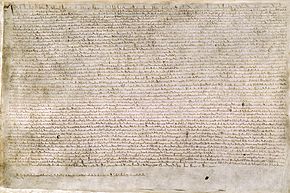
The Parliament of England had its roots in the restrictions on the power of kings written into Magna Carta, which explicitly protected certain rights of the King's subjects, whether free or fettered – and implicitly supported what became English writ of habeas corpus, safeguarding individual freedom against unlawful imprisonment with right to appeal. The first elected parliament was De Montfort's Parliament in England in 1265.
However only a small minority actually had a voice; Parliament was elected by only a few percent of the population, (less than 3% as late as 1780), and the power to call parliament was at the pleasure of the monarch (usually when he or she needed funds).
The power of Parliament increased in stages over the succeeding centuries. After the Glorious Revolution of 1688, the English Bill of Rights of 1689 was enacted, which codified certain rights and increased the influence of Parliament. The franchise was slowly increased and Parliament gradually gained more power until the monarch became largely a figurehead. As the franchise was increased, it also was made more uniform, as many so-called rotten boroughs, with a handful of voters electing a Member of Parliament, were eliminated in the Reform Act of 1832.
In North America, the English Puritans who migrated from 1620 established colonies in New England whose local governance was democratic and which contributed to the democratic development of the United States, although these local assemblies had some small amounts of devolved power the ultimate authority was held by the Crown and the English Parliament.
Modern era
18th and 19th centuries
The first nation in modern history to adopt a democratic constitution was the short-lived Corsican Republic in 1755. This Corsican Constitution was the first based on Enlightenment principles and even allowed for female suffrage, something that was granted in other democracies only by the 20th century. In 1789, Revolutionary France adopted the Declaration of the Rights of Man and of the Citizen and, although short-lived, the National Convention was elected by all males in 1792.
Universal male suffrage was established in France in March 1848 in the wake of the French Revolution of 1848. In 1848, several revolutions broke out in Europe as rulers were confronted with popular demands for liberal constitutions and more democratic government.
Although not described as a democracy by the founding fathers, the United States founders also shared a determination to root the American experiment in the principle of natural freedom and equality. The United States Constitution, adopted in 1788, provided for an elected government and protected civil rights and liberties for some.
In the colonial period before 1776, and for some time after, often only adult white male property owners could vote; enslaved Africans, most free black people and most women were not extended the franchise. On the American frontier, democracy became a way of life, with widespread social, economic and political equality. However, slavery was a social and economic institution, particularly in eleven states in the American South, such that a variety of organizations were established advocating the movement of black people from the United States to locations where they would enjoy greater freedom and equality.
In the 1860 United States Census the slave population in the United States had grown to four million, and in Reconstruction after the Civil War (late 1860s) the newly freed slaves became citizens with (in the case of men) a nominal right to vote.
Full enfranchisement of citizens was not secured until after the African-American Civil Rights Movement (1955–1968) gained passage by the United States Congress of the Voting Rights Act of 1965.
20th and 21st centuries
20th century transitions to liberal democracy have come in successive "waves of democracy," variously resulting from wars, revolutions, decolonization, religious and economic circumstances. World War I and the dissolution of the Ottoman and Austro-Hungarian empires resulted in the creation of new nation-states from Europe, most of them at least nominally democratic.
In the 1920s democracy flourished, but the Great Depression brought disenchantment, and most of the countries of Europe, Latin America, and Asia turned to strong-man rule or dictatorships. Fascism and dictatorships flourished in Nazi Germany, Italy, Spain and Portugal, as well as nondemocratic regimes in the Baltics, the Balkans, Brazil, Cuba, China, and Japan, among others.
World War II brought a definitive reversal of this trend in western Europe. The democratization of the American, British, and French sectors of occupied Germany (disputed), Austria, Italy, and the occupied Japan served as a model for the later theory of regime change.
However, most of Eastern Europe, including the Soviet sector of Germany fell into the non-democratic Soviet bloc. The war was followed by decolonization, and again most of the new independent states had nominally democratic constitutions. India emerged as the world's largest democracy and continues to be so.
By 1960, the vast majority of country-states were nominally democracies, although most of the world's populations lived in nations that experienced sham elections, and other forms of subterfuge (particularly in Communist nations and the former colonies.)
A subsequent wave of democratization brought substantial gains toward true liberal democracy for many nations. Spain, Portugal (1974), and several of the military dictatorships in South America returned to civilian rule in the late 1970s and early 1980s ( Argentina in 1983, Bolivia, Uruguay in 1984, Brazil in 1985, and Chile in the early 1990s). This was followed by nations in East and South Asia by the mid-to-late 1980s.
Economic malaise in the 1980s, along with resentment of Soviet oppression, contributed to the collapse of the Soviet Union, the associated end of the Cold War, and the democratization and liberalization of the former Eastern bloc countries. The most successful of the new democracies were those geographically and culturally closest to western Europe, and they are now members or candidate members of the European Union. Some researchers consider that contemporary Russia is not a true democracy and instead resembles a form of dictatorship.
The liberal trend spread to some nations in Africa in the 1990s, most prominently in South Africa. Some recent examples of attempts of liberalization include the Indonesian Revolution of 1998, the Bulldozer Revolution in Yugoslavia, the Rose Revolution in Georgia, the Orange Revolution in Ukraine, the Cedar Revolution in Lebanon, the Tulip Revolution in Kyrgyzstan, and the Jasmine Revolution in Tunisia.
According to Freedom House, in 2007 there were 123 electoral democracies (up from 40 in 1972). According to World Forum on Democracy, electoral democracies now represent 120 of the 192 existing countries and constitute 58.2 percent of the world's population. At the same time liberal democracies i.e. countries Freedom House regards as free and respectful of basic human rights and the rule of law are 85 in number and represent 38 percent of the global population.
In 2010 the United Nations declared September 15 the International Day of Democracy.
Countries
The following countries are categorized by the Democracy Index 2011 as Full democracy:
|
1. Norway |
6. Australia |
11. Luxembourg |
16. Czech Republic |
21. Japan |
The Index assigns 53 countries to the next category, Flawed democracy: Argentina, Benin, Botswana, Brazil, Bulgaria, Cape Verde, Chile, Colombia, Croatia, Cyprus, Dominican Republic, El Salvador, Estonia, France, Ghana, Greece, Guyana, Hungary, Indonesia, India, Israel, Italy, Jamaica, Latvia, Lesotho, Lithuania, Macedonia, Malaysia, Mali, Mexico, Moldova, Mongolia, Montenegro, Namibia, Panama, Papua New Guinea, Paraguay, Peru, Philippines, Poland, Portugal, Indonesia, Romania, Serbia, Slovakia, Slovenia, South Africa, Sri Lanka, Suriname, Taiwan, Thailand, Timor-Leste, Trinidad and Tobago, Zambia
Types
Democracy has taken a number of forms, both in theory and practice. Some varieties of democracy provide better representation and more freedom for their citizens than others. However, if any democracy is not structured so as to prohibit the government from excluding the people from the legislative process, or any branch of government from altering the separation of powers in its own favour, then a branch of the system can accumulate too much power and destroy the democracy.
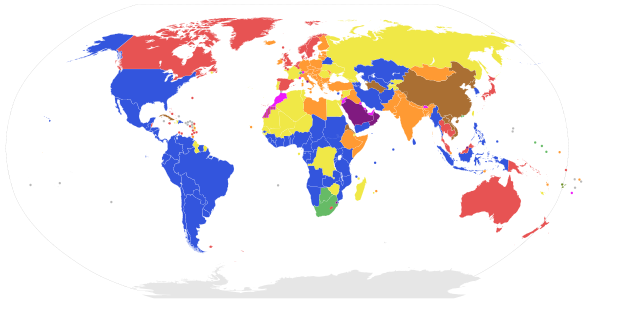
|
The following kinds of democracy are not exclusive of one another: many specify details of aspects that are independent of one another and can co-exist in a single system.
Basic forms
Direct
Direct democracy is a political system where the citizens participate in the decision-making personally, contrary to relying on intermediaries or representatives. The supporters of direct democracy argue that democracy is more than merely a procedural issue. A direct democracy gives the voting population the power to:
- Change constitutional laws,
- Put forth initiatives, referendums and suggestions for laws,
- Give binding orders to elective officials, such as revoking them before the end of their elected term, or initiating a lawsuit for breaking a campaign promise.
Of the three measures mentioned, most operate in developed democracies today. This is part of a gradual shift towards direct democracies. Elements of direct democracy exist on a local level in many countries, though these systems often coexist with representative assemblies. Usually, this includes equal (and more or less direct) participation in the proposal, development and passage of legislation into law.
Representative
Representative democracy involves the selection of government officials by the people being represented. If the head of state is also democratically elected then it is called a democratic republic. The most common mechanisms involve election of the candidate with a majority or a plurality of the votes.
Representatives may be elected or become diplomatic representatives by a particular district (or constituency), or represent the entire electorate through proportional systems, with some using a combination of the two. Some representative democracies also incorporate elements of direct democracy, such as referendums. A characteristic of representative democracy is that while the representatives are elected by the people to act in the people's interest, they retain the freedom to exercise their own judgment as how best to do so.
Parliamentary
Parliamentary democracy is a representative democracy where government is appointed by representatives as opposed to a 'presidential rule' wherein the President is both head of state and the head of government and is elected by the voters. Under a parliamentary democracy, government is exercised by delegation to an executive ministry and subject to ongoing review, checks and balances by the legislative parliament elected by the people.
Parliamentary systems have the right to dismiss a Prime Minister at any point in time that they feel he or she is not doing their job to the expectations of the legislature. This is done through a Vote of No Confidence where the legislature decides whether or not to remove the Prime Minister from office by a majority support for his or her dismissal. In some countries, the Prime Minister can also call an election whenever he or she so chooses, and typically the Prime Minister will hold an election when he or she knows that they are in good favour with the public as to get re-elected. In other parliamentary democracies extra elections are virtually never held, a minority government being preferred until the next ordinary elections.
Presidential
Presidential Democracy is a system where the public elects the president through free and fair elections. The president serves as both the head of state and head of government controlling most of the executive powers. The president serves for a specific term and cannot exceed that amount of time. Elections typically have a fixed date and aren’t easily changed. The president has direct control over the cabinet, the members of which are specifically appointed by the president himself.
The president cannot be easily removed from office by the legislature, but he or she cannot remove members of the legislative branch any more easily. This provides some measure of separation of powers. In consequence however, the president and the legislature may end up in the control of separate parties, allowing one to block the other and thereby interfere with the orderly operation of the state. This may be the reason why presidential democracy is not very common outside the Americas.
A semi-presidential system is a system of democracy in which the government includes both a prime minister and a president. The particular powers held by the prime minister and president vary by country.
Constitutional
A constitutional democracy is a representative democracy in which the ability of the elected representatives to exercise decision-making power is subject to the rule of law, and usually moderated by a constitution that emphasizes the protection of the rights and freedoms of individuals, and which places constraints on the leaders and on the extent to which the will of the majority can be exercised against the rights of minorities (see civil liberties).
In a constitutional democracy, it is possible for some large-scale decisions to emerge from the many individual decisions that citizens are free to make. In other words, citizens can "vote with their feet" or "vote with their dollars", resulting in significant informal government-by-the-masses that exercises many "powers" associated with formal government elsewhere.
Hybrid
Some modern democracies that are predominately representative in nature also heavily rely upon forms of political action that are directly democratic. These democracies, which combine elements of representative democracy and direct democracy, are termed hybrid democracies or semi-direct democracies. Examples include Switzerland and some U.S. states, where frequent use is made of referendums and initiatives.
Although managed by a representative legislative body, Switzerland allows for initiatives and referendums at both the local and federal levels. In the past 120 years less than 250 initiatives have been put to referendum. The populace has been conservative, approving only about 10% of the initiatives put before them; in addition, they have often opted for a version of the initiative rewritten by government.
In the United States, no mechanisms of direct democracy exists at the federal level, but over half of the states and many localities provide for citizen-sponsored ballot initiatives (also called "ballot measures", "ballot questions" or "propositions"), and the vast majority of states allow for referendums. Examples include the extensive use of referendums in the US state of California, which is a state that has more than 20 million voters.
In New England Town meetings are often used, especially in rural areas, to manage local government. This creates a hybrid form of government, with a local direct democracy and a state government which is representative. For example, most Vermont towns hold annual town meetings in March in which town officers are elected, budgets for the town and schools are voted on, and citizens have an opportunity to speak and by heard on political matters.
Variants
Republic
In contemporary usage, the term democracy refers to a government chosen by the people, whether it is direct or representative. The term republic has many different meanings, but today often refers to a representative democracy with an elected head of state, such as a president, serving for a limited term, in contrast to states with a hereditary monarch as a head of state, even if these states also are representative democracies with an elected or appointed head of government such as a prime minister.
The Founding Fathers of the United States rarely praised and often criticized democracy, which in their time tended to specifically mean direct democracy, often without the protection of a Constitution enshrining basic rights; James Madison argued, especially in The Federalist No. 10, that what distinguished a democracy from a republic was that the former became weaker as it got larger and suffered more violently from the effects of faction, whereas a republic could get stronger as it got larger and combats faction by its very structure.
What was critical to American values, John Adams insisted, was that the government be "bound by fixed laws, which the people have a voice in making, and a right to defend." As Benjamin Franklin was exiting after writing the U.S. constitution, a woman asked him "Well, Doctor, what have we got—a republic or a monarchy?". He replied "A republic—if you can keep it."
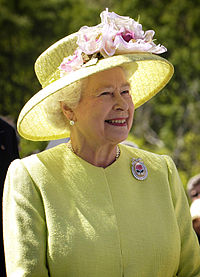
Constitutional monarchy
Initially after the American and French revolutions, the question was open whether a democracy, in order to restrain unchecked majority rule, should have an élite upper chamber, the members perhaps appointed meritorious experts or having lifetime tenures, or should have a constitutional monarch with limited but real powers. Some countries (as Britain, the Netherlands, Belgium, Scandinavian countries, Thailand, Japan and Bhutan) turned powerful monarchs into constitutional monarchs with limited or, often gradually, merely symbolic roles.
Often the monarchy was abolished along with the aristocratic system (as in France, China, Russia, Germany, Austria, Hungary, Italy, Greece and Egypt). Many nations had élite upper houses of legislatures which often had lifetime tenure, but eventually these lost power (as in Britain) or else became elective and remained powerful (as in the United States).
Socialist
Socialist thought has several different views on democracy. Social democracy, democratic socialism, and the dictatorship of the proletariat (usually exercised through Soviet democracy) are some examples. Many democratic socialists and social democrats believe in a form of participatory democracy and workplace democracy combined with a representative democracy.
Within Marxist orthodoxy there is a hostility to what is commonly called "liberal democracy", which they simply refer to as parliamentary democracy because of its often centralized nature. Because of their desire to eliminate the political elitism they see in capitalism, Marxists, Leninists and Trotskyists believe in direct democracy implemented through a system of communes (which are sometimes called soviets). This system ultimately manifests itself as council democracy and begins with workplace democracy. (See Democracy in Marxism)
Democracy cannot consist solely of elections that are nearly always fictitious and managed by rich landowners and professional politicians.—Che Guevara, Speech, Uruguay, 1961
Anarchist
Anarchists are split in this domain, depending on whether they believe that a majority-rule is tyrannic or not. The only form of democracy considered acceptable to many anarchists is direct democracy. Pierre-Joseph Proudhon argued that the only acceptable form of direct democracy is one in which it is recognized that majority decisions are not binding on the minority, even when unanimous. However, anarcho-communist Murray Bookchin criticized individualist anarchists for opposing democracy, and says "majority rule" is consistent with anarchism.
Some anarcho-communists oppose the majoritarian nature of direct democracy, feeling that it can impede individual liberty and opt in favour of a non-majoritarian form of consensus democracy, similar to Proudhon's position on direct democracy. Henry David Thoreau, who did not self-identify as an anarchist but argued for "a better government" and is cited as an inspiration by some anarchists, argued that people should not be in the position of ruling others or being ruled when there is no consent.
Demarchy
Sometimes called "democracy without elections", demarchy uses sortition to choose decision makers via a random process. The intention is that those chosen will be representative of the opinions and interests of the people at large, and be more fair and impartial than an elected official. The technique was in widespread use in Athenian Democracy and is still used in modern jury selection.
Consensus
Consensus democracy requires varying degrees of consensus rather than just a mere democratic majority. It typically attempts to protect minority rights from domination by majority rule.
Supranational
Qualified majority voting is designed by the Treaty of Rome to be the principal method of reaching decisions in the European Council of Ministers. This system allocates votes to member states in part according to their population, but heavily weighted in favour of the smaller states. This might be seen as a form of representative democracy, but representatives to the Council might be appointed rather than directly elected.
Some might consider the "individuals" being democratically represented to be states rather than people, as with many others. European Parliament members are democratically directly elected on the basis of universal suffrage, may be seen as an example of a supranational democratic institution.
Non-governmental
Aside from the public sphere, similar democratic principles and mechanisms of voting and representation have been used to govern other kinds of communities and organizations. Many non-governmental organizations decide policy and leadership by voting. Most trade unions and cooperatives are governed by democratic elections. Corporations are controlled by shareholders on the principle of one share, one vote.
Theory
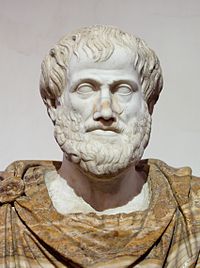
Aristotle
Aristotle contrasted rule by the many (democracy/ polity), with rule by the few (oligarchy/ aristocracy), and with rule by a single person ( tyranny or today autocracy/monarchy). He also thought that there was a good and a bad variant of each system (he considered democracy to be the degenerate counterpart to polity).
For Aristotle the underlying principle of democracy is freedom, since only in a democracy the citizens can have a share in freedom. In essence, he argues that this is what every democracy should make its aim. There are two main aspects of freedom: being ruled and ruling in turn, since everyone is equal according to number, not merit, and to be able to live as one pleases.
But one factor of liberty is to govern and be governed in turn; for the popular principle of justice is to have equality according to number, not worth, .... And one is for a man to live as he likes; for they say that this is the function of liberty, inasmuch as to live not as one likes is the life of a man that is a slave.—Aristotle, Politics 1317b (Book 6, Part II)
Rationale
Among modern political theorists, there are three contending conceptions of the fundamental rationale for democracy: aggregative democracy, deliberative democracy, and radical democracy.
Aggregative
The theory of aggregative democracy claims that the aim of the democratic processes is to solicit citizens’ preferences and aggregate them together to determine what social policies society should adopt. Therefore, proponents of this view hold that democratic participation should primarily focus on voting, where the policy with the most votes gets implemented.
Different variants of aggregative democracy exist. Under minimalism, democracy is a system of government in which citizens have give teams of political leaders the right to rule in periodic elections. According to this minimalist conception, citizens cannot and should not “rule” because, for example, on most issues, most of the time, they have no clear views or their views are not well-founded. Joseph Schumpeter articulated this view most famously in his book Capitalism, Socialism, and Democracy. Contemporary proponents of minimalism include William H. Riker, Adam Przeworski, Richard Posner.
According to the theory of direct democracy, on the other hand, citizens should vote directly, not through their representatives, on legislative proposals. Proponents of direct democracy offer varied reasons to support this view. Political activity can be valuable in itself, it socializes and educates citizens, and popular participation can check powerful elites. Most importantly, citizens do not really rule themselves unless they directly decide laws and policies.
Governments will tend to produce laws and policies that are close to the views of the median voter– with half to his left and the other half to his right. This is not actually a desirable outcome as it represents the action of self-interested and somewhat unaccountable political elites competing for votes. Anthony Downs suggests that ideological political parties are necessary to act as a mediating broker between individual and governments. Downs laid out this view in his 1957 book An Economic Theory of Democracy.
Robert A. Dahl argues that the fundamental democratic principle is that, when it comes to binding collective decisions, each person in a political community is entitled to have his/her interests be given equal consideration (not necessarily that all people are equally satisfied by the collective decision). He uses the term polyarchy to refer to societies in which there exists a certain set of institutions and procedures which are perceived as leading to such democracy. First and foremost among these institutions is the regular occurrence of free and open elections which are used to select representatives who then manage all or most of the public policy of the society. However, these polyarchic procedures may not create a full democracy if, for example, poverty prevents political participation.
Some see a problem with the wealthy having more influence and therefore argue for reforms like campaign finance reform. Some may see it as a problem that only voters decide policy, as opposed to a majority rule of the entire population. This can be used as an argument for making political participation mandatory, like compulsory voting or for making it more patient (non-compulsory) by simply refusing power to the government until the full majority feels inclined to speak their minds.
Deliberative
Deliberative democracy is based on the notion that democracy is government by deliberation. Unlike aggregative democracy, deliberative democracy holds that, for a democratic decision to be legitimate, it must be preceded by authentic deliberation, not merely the aggregration of preferences that occurs in voting. Authentic deliberation is deliberation among decision-makers that is free from distortions of unequal political power, such as power a decision-maker obtained through economic wealth or the support of interest groups. If the decision-makers cannot reach consensus after authentically deliberating on a proposal, then they vote on the proposal using a form of majority rule.
Radical
Radical democracy is based on the idea that there are hierarchical and oppressive power relations that exist in society. Democracy's role is to make visible and challenge those relations by allowing for difference, dissent and antagonisms in decision making processes.
Ideal forms
Inclusive
Inclusive democracy is a political theory and political project that aims for direct democracy in all fields of social life: political democracy in the form of face-to-face assemblies which are confederated, economic democracy in a stateless, moneyless and marketless economy, democracy in the social realm, i.e. self-management in places of work and education, and ecological democracy which aims to reintegrate society and nature. The theoretical project of inclusive democracy emerged from the work of political philosopher Takis Fotopoulos in "Towards An Inclusive Democracy" and was further developed in the journal Democracy & Nature and its successor The International Journal of Inclusive Democracy.
The basic unit of decision making in an inclusive democracy is the demotic assembly, i.e. the assembly of demos, the citizen body in a given geographical area which may encompass a town and the surrounding villages, or even neighbourhoods of large cities. An inclusive democracy today can only take the form of a confederal democracy that is based on a network of administrative councils whose members or delegates are elected from popular face-to-face democratic assemblies in the various demoi. Thus, their role is purely administrative and practical, not one of policy-making like that of representatives in representative democracy.
The citizen body is advised by experts but it is the citizen body which functions as the ultimate decision-taker . Authority can be delegated to a segment of the citizen body to carry out specific duties, for example to serve as members of popular courts, or of regional and confederal councils. Such delegation is made, in principle, by lot, on a rotation basis, and is always recallable by the citizen body. Delegates to regional and confederal bodies should have specific mandates.
Participatory politics
A Parpolity or Participatory Polity is a theoretical form of democracy that is ruled by a Nested Council structure. The guiding philosophy is that people should have decision making power in proportion to how much they are affected by the decision. Local councils of 25–50 people are completely autonomous on issues that affect only them, and these councils send delegates to higher level councils who are again autonomous regarding issues that affect only the population affected by that council.
A council court of randomly chosen citizens serves as a check on the tyranny of the majority, and rules on which body gets to vote on which issue. Delegates can vote differently than their sending council might wish, but are mandated to communicate the wishes of their sending council. Delegates are recallable at any time. Referendums are possible at any time via votes of most lower-level councils, however, not everything is a referendum as this is most likely a waste of time. A parpolity is meant to work in tandem with a participatory economy.
Cosmopolitan
Cosmopolitan democracy, also known as Global democracy or World Federalism, is a political system in which democracy is implemented on a global scale, either directly or through representatives. An important justification for this kind of system is that the decisions made in national or regional democracies often affect people outside the constituency who, by definition, cannot vote. By contrast, in a cosmopolitan democracy, the people who are affected by decisions also have a say in them.
According to its supporters, any attempt to solve global problems is undemocratic without some form of cosmopolitan democracy. The general principle of cosmopolitan democracy is to expand some or all of the values and norms of democracy, including the rule of law; the non-violent resolution of conflicts; and equality among citizens, beyond the limits of the state. To be fully implemented, this would require reforming existing international organizations, e.g. the United Nations, as well as the creation of new institutions such as a World Parliament, which ideally would enhance public control over, and accountability in, international politics.
Cosmopolitan Democracy has been promoted, among others, by physicist Albert Einstein, writer Kurt Vonnegut, columnist George Monbiot, and professors David Held and Daniele Archibugi. The creation of the International Criminal Court in 2003 was seen as a major step forward by many supporters of this type of cosmopolitan democracy.
Criticism
Inefficiencies
Economists since Milton Friedman have strongly criticized the efficiency of democracy. They base this on their premise of the irrational voter. Their argument is that voters are highly uninformed about many political issues, especially relating to economics, and have a strong bias about the few issues on which they are fairly knowledgeable.
Popular rule as a façade
The 20th Century Italian thinkers Vilfredo Pareto and Gaetano Mosca (independently) argued that democracy was illusory, and served only to mask the reality of elite rule. Indeed, they argued that elite oligarchy is the unbendable law of human nature, due largely to the apathy and division of the masses (as opposed to the drive, initiative and unity of the elites), and that democratic institutions would do no more than shift the exercise of power from oppression to manipulation. As Louis Brandeis once professed, "We may have democracy, or we may have wealth concentrated in the hands of a few, but we can't have both."
All political parties in Canada are now cautious about criticism of the high level of immigration, because, as noted by The Globe and Mail, "in the early 1990s, the old Reform Party was branded 'racist' for suggesting that immigration levels be lowered from 250,000 to 150,000." As Professor of Economics Don J. DeVoretz pointed out, "In a liberal democracy such as Canada, the following paradox persists. Even though the majority of respondents answer yes to the question: 'Are there too many immigrant arrivals each year?' immigrant numbers continue to rise until a critical set of economic costs appear."
Mob rule
Plato's The Republic presents a critical view of democracy through the narration of Socrates: "Democracy, which is a charming form of government, full of variety and disorder, and dispensing a sort of equality to equals and unequaled alike." In his work, Plato lists 5 forms of government from best to worst. Assuming that the Republic was intended to be a serious critique of the political thought in Athens, Plato argues that only Kallipolis, an aristocracy led by the unwilling philosopher-kings (the wisest men), is a just form of government.
James Madison critiqued direct democracy (which he referred to simply as "democracy") in Federalist No. 10, arguing that representative democracy—which he described using the term "republic"—is a preferable form of government, saying: "...democracies have ever been spectacles of turbulence and contention; have ever been found incompatible with personal security or the rights of property; and have in general been as short in their lives as they have been violent in their deaths." Madison offered that republics were superior to democracies because republics safeguarded against tyranny of the majority, stating in Federalist No. 10: "the same advantage which a republic has over a democracy, in controlling the effects of faction, is enjoyed by a large over a small republic".
Political instability
More recently, democracy is criticized for not offering enough political stability. As governments are frequently elected on and off there tends to be frequent changes in the policies of democratic countries both domestically and internationally. Even if a political party maintains power, vociferous, headline grabbing protests and harsh criticism from the mass media are often enough to force sudden, unexpected political change. Frequent policy changes with regard to business and immigration are likely to deter investment and so hinder economic growth. For this reason, many people have put forward the idea that democracy is undesirable for a developing country in which economic growth and the reduction of poverty are top priorities.
This opportunist alliance not only has the handicap of having to cater to too many ideologically opposing factions, but it is usually short lived since any perceived or actual imbalance in the treatment of coalition partners, or changes to leadership in the coalition partners themselves, can very easily result in the coalition partner withdrawing its support from the government.
Fraudulent elections
In representative democracies, it may not benefit incumbents to conduct fair elections. A study showed that incumbents who rig elections stay in office 2.5 times as long as those who permit fair elections. Above $2,700 per capita democracies have been found to be less prone to violence, but below that threshold, more violence. The same study shows that election misconduct is more likely in countries with low per capita incomes, small populations, rich in natural resources, and a lack of institutional checks and balances. Sub-Saharan countries, as well as Afghanistan, all tend to fall into that category.
Governments that have frequent elections tend to have significantly more stable economic policies than those governments who have infrequent elections. However, this trend does not apply to governments that hold fraudulent elections.
Opposition
Democracy in modern times has almost always faced opposition from the previously existing government, and many times it has faced opposition from social elites. The implementation of a democratic government within a non-democratic state is typically brought about by democratic revolution. Monarchy had traditionally been opposed to democracy, and to this day remains opposed to the abolition of its privileges, although often political compromise has been reached in the form of shared government.
Post-Enlightenment ideologies such as Fascism, Nazism and Neo-Fundamentalism oppose democracy on different grounds, generally citing that the concept of democracy as a constant process is flawed and detrimental to a preferable course of development.
Development
Several philosophers and researchers outlined historical and social factors supporting the evolution of democracy. Cultural factors like Protestantism influenced the development of democracy, rule of law, human rights and political liberty (the faithful elected priests, religious freedom and tolerance has been practiced).
Others mentioned the influence of wealth (e.g. S. M. Lipset, 1959). In a related theory, Ronald Inglehart suggests that the increase in living standards has convinced people that they can take their basic survival for granted, and led to increased emphasis on self-expression values, which is highly correlated to democracy.
Recently established theories stress the relevance of education and human capital and within them of cognitive ability to increasing tolerance, rationality, political literacy and participation. Two effects of education and cognitive ability are distinguished: a cognitive effect (competence to make rational choices, better information processing) and an ethical effect (support of democratic values, freedom, human rights etc.), which itself depends on intelligence.
Evidence that is consistent with conventional theories of why democracy emerges and is sustained has been hard to come by. Recent statistical analyses have challenged modernization theory by demonstrating that there is no reliable evidence for the claim that democracy is more likely to emerge when countries become wealthier, more educated, or less unequal. Neither is there convincing evidence that increased reliance on oil revenues prevents democratization, despite a vast theoretical literature called " The Resource Curse" that asserts that oil revenues sever the link between citizen taxation and government accountability, the key to representative democracy. The lack of evidence for these conventional theories of democratization have led researchers to search for the "deep" determinants of contemporary political institutions, be they geographical or demographic.
In the 21st century, democracy has become such a popular method of reaching decisions that its application beyond politics to other areas such as entertainment, food and fashion, consumerism, urban planning, education, art, literature, science and theology has been criticized as "the reigning dogma of our time". The argument is that applying a populist or market-driven approach to art and literature for example, means that innovative creative work goes unpublished or unproduced. In education, the argument is that essential but more difficult studies are not undertaken. Science, which is a truth-based discipline, is particularly corrupted by the idea that the correct conclusion can be arrived at by popular vote.
In 2010 a study by a German military think tank has analyzed how peak oil might change the global economy. The study raises fears for the survival of democracy itself. It suggests that parts of the population could perceive the upheaval triggered by peak oil as a general systemic crisis. This would create "room for ideological and extremist alternatives to existing forms of government".

